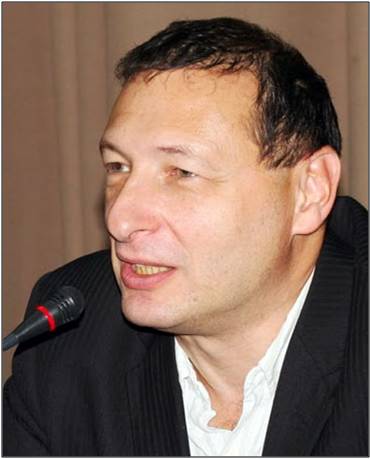Like this blog? rabble is reader-supported. Please chip in.
Boris Kagarlitksy PhD is a Marxist and sociologist who lives and works in Moscow. He is the director of the Institute for Globalization and Social Movements and is the author of many books on the world system of globalized capitalism and the history and contemporary politics of Russia and the Soviet Union.
Dr. Kagarlitsky will speak in four cities in Canada from September 25 to October 1. See below for full details of his speaking events:
Winnipeg, on September 24 and 27
Vancouver, on September 28 and 29
Victoria, on September 30
Toronto, on October 1
Canadian media contact for Dr. Kagarlitsky’s speaking tour: 778 858 5179, or newcoldwareditors (at) gmail.com. Here is his detailed schdule:
Winnipeg, Manitoba:
Boris Kagarlitsky will speak at two sessions of the inaugural conference of the Geopolitical Economy Research Group at the University of Manitoba. The conference is titled, From the Thirty Years’ Crisis to Multi-polarity:The Evolution of the Geopolitical Economy of the 21st Century World. Boris Kagarlitsky will speak on September 24 at 7 pm and September 27 at 3:30 pm.
Panel discussion: ‘Reflections on a century of transformation’, Winnipeg Free Press Geopolitical Economy Lecture Series, September 24, 7 pm – 8:30 pm, at Fort Garry Hotel, 222 Broadway. Open to the public, admission is free.
Closing plenary lecture: ‘Post-Communist Russia in a Multipolar World’, at Robert Schultz Theatre, St. John’s College, University of Manitoba, 3:30 pm – 5 pm. To attend an entire day of the three-day conference, registration is required and the fee is $50 per day (including lunch). Registration information and full schedule is at the weblink here. All conference events are at St. John’s College, University of Manitoba.
Vancouver BC (two events)
1. Lecture: Post-communist Russia in a multi-polar world
Monday, Sept 28, 7 pm – 9 pm
At: Simon Fraser University, downtown campus, 515 W Hastings St, Room 7000, admission free
Sponsor: Institute for the Humanities, at Simon Fraser University. Co-sponsored by SFU’s School for International Studies, Geopolitical Economy Research Group (University of Manitoba), and The New Cold War: Ukraine and beyond (www.newcoldwar.org).
Facebook event (This lecture will be filmed and broadcast on YouTube one week later.)
2. Lecture: Russia, Ukraine and NATO: Roots of the present conflict
Tuesday, Sept 29, 5pm – 6:30pm
At: Green College, Coach House, 6201 Cecil Green Park Road, UBC campus, admission free
Sponsor: Green College lecture series ‘Eurasian States and Societies: Past and Present’.
Victoria BC
Lecture: Russia, Ukraine and NATO: Roots of the present conflict
Wednesday, September 30, 3:30 pm – 5 pm
At: University of Victoria, David Turpin Building, Room A357, 3:30 pm to 4:30 pm, admission free
Sponsor: Center for Global Studies.
Toronto, Ontario
Lecture: Russia in the global crisis: Geopolitical dilemmas, strategic responses
Thursday, October 1, 2015, 7:30 pm – 9:30 pm
At: Beit Zatoun, 612 Markham St. (Bathurst and Bloor), admission free, donations welcome.
Speakers:
* Boris Kagarlitsky, Director, Institute of Globalization and Social Movements (Moscow)
* Sergei M. Plekhanov, Associate Professor of Political Science at York University, former Deputy Director of the Institute for US and Canadian Studies in Russia
Sponsored by: Centre for Social Justice, Socialist Project, and Canada Research Chair in Comparative Politics (York University)
_____________________________________________________________________________________
Russia’s integration into the capitalist world system (together with other post-Soviet states) was based on a compromise between local and global elites. Russia became a supplier of oil and other raw materials to the Western-dominated global economy. But ownership and control over the process ultimately came to rest in the hands of the local oligarchy. This agreement satisfied everyone until the global financial crisis broke out in 2007. Since then, given the new difficulties facing the capitalist system in Europe and elsewhere, Western elites are seeking access to new and cheaper resources. This clashes with the relative strengthening of the position of leading economies of the capitalist periphery during the past 15 years, including those of Russia and other BRICS countries.
The policy of the EU towards Greece and Spain, and Russia and Ukraine, is to “revisit” and revise the conditions of these countries’ integration into the global system. Local oligarchies are to be pushed aside and direct, neo-colonial control is to be established over resources and property. Local elites will try to resist this pressure but will fail to do so, or they will do so only partially. Their resistance nevertheless opens new paths for popular resistance and for the emergence of new forms of popular political expression.
Biography:
Boris Kagarlitsky PhD is an outspoken author, lecturer and activist on the social and political inequalities of globalized capitalism. Born in 1958, he is the director of the Institute of Globalization Social Movements in Moscow. He has authored multiple books on globalization and Russia’s transition from the state-run economy of the Soviet era to capitalism. Fourteen of his books are translated to English.
Dr. Kagarlitsky was a dissident in the USSR during the presidency of Leonid Brezhnev and served more than one year in prison. He served as a deputy to Moscow city council and was arrested in 1993 when that elected body was disbanded during the rule of President Boris Yeltsin. He earned his PhD in political economy at the Russian Academy of Sciences in 1995. His 1988 ‘The Thinking Reed: Intellectuals and the Soviet State 1917 to the present’ won the Deutscher Memorial Prize that year. His latest book is ‘From Empires to Imperialism: The State and the Rise of Bourgeois Civilisation’ (Routledge, 2014).
Like this blog? rabble is reader-supported. Please chip in.



